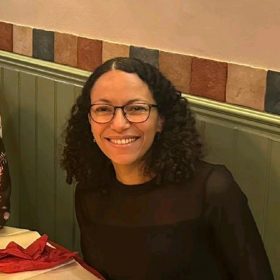
Conference Stream
08.15 – 09.00
Registration and Welcome Coffee
09.00 – 09.45: Large Language Models and how they can be applied in finance

Svetlana Borovkova:
Head of Quantitative Modelling, Probability & Partners. Associate Prof, Vrije Universiteit Amsterdam
Svetlana Borovkova: Head of Quantitative Modelling, Probability & Partners and Associate Professor, Vrije Universiteit Amsterdam
Dr Svetlana Borovkova is the partner and Head of Quant Modelling of risk management consulting firm Probability and Partners and an Associate Professor of Quantitative Finance and Risk Management at the Vrije Universiteit Amsterdam. She is the author of over 60 academic and professional publications and a frequent speaker at conferences such as RiskMinds and QuantMinds. Her work encompasses a wide range of topics, ranging from derivatives pricing and risk modelling to sentiment analysis for quant investing and machine learning in quant finance. Find her work at SSRN and her columns on various finance topics in Financial Investigator.
09.45 – 10.30: Deep Hedging
Abstract:
Traditional risk management is based on the Greeks provided by classical valuation models. These models typically have simplified dynamics and assume perfect hedge-ability.
As a result, decisions on when and how to hedge are based on traders’ intuition, experience, and view on market dynamics.
With Deep Hedging , we go beyond Greek-based hedging and take a new approach to exotics risk management.
Deep Hedging formulates the hedging problem as a reinforcement learning problem and shifts towards the machine learning paradigm.
We solve for the optimal hedging in incomplete markets using a periodic policy search.
The model-based policy search approximates the hedging actions, the policy, using deep neural networks.

Amira Akkari:
Executive Director, JP Morgan
Amira Akkari: Executive Director, JP Morgan
Amira is an Executive Director at JP Morgan CIB. She is one of the leads of the Quantitative Research team for Equity Derivatives Exotics. She has 15 years’ experience in the quant industry and has worked with industry leaders in this space.
The Front Office quant team works closely with traders to enhance and expand Equity models for Exotic products’ risk management. Amira has expanded her focus in the last years to cover AI models and data-driven solutions’ development and adoption for financial applications in Markets.
Models include classic supervised learning as well as reinforcement learning models for derivatives risk management, such as Deep Hedging. JP Morgan was elected Equity House of the Year by Risk Magazine, twice in the last three years; quant innovative models were cited as key factors in this success
10.30 – 11.00: Morning Break and Networking Opportunities
11.00 – 11.45: Financial Times Series Prediction in the Age of Transformers

Nicole Königstein:
Chief Data Scientist, Head of AI & Quant Research, Wyden Capital AG
Nicole Königstein: Chief Data Scientist, Head of AI & Quant Research, Wyden Capital AG
Nicole Königstein is a distinguished Data Scientist and Quantitative Researcher, currently working as Data Science and Technology Lead at impactvise, an ESG analytics company, and as Head of AI and Quantitative Research at Quantmate, an innovative FinTech startup focused on alternative data in predictive modeling. Alongside her roles in these organizations, she serves as an AI consultant across diverse industries, leading workshops and guiding companies from the conceptual stages of AI implementation through to final deployment.
As a guest lecturer, Nicole shares her expertise in Python, machine learning, and deep learning at various universities. She is a regular speaker at renowned AI and Data Science conferences, where she conducts workshops and educational sessions. In addition, she is an influential voice in the data science community, regularly reviewing books in her field and offering her insights and critiques. Nicole is also the author of the well-received online course, “Math for Machine Learning.
11.45 – 12.30: PANEL: Talent Attraction & Retention:
Recruiting/Retaining talent
- What are QR Financial Services currently doing and what should they be doing to attract more female talent?
- What strategies are financial companies using to retain talent? Is there anything else that could be done?
Career progression
- At more senior levels the number of women is even lower than at entry level which means that the female population retention rate is low or/and women are not being promoted. Discuss
- Are quantitative positions too specialised which prevents women (and men) to move horizontally to different (and possibly more senior) roles?
- Hybrid working model-does it benefit for retaining/advancing women careers?
- Mentoring vs sponsorship programmes that could specifically help Diversity & Inclusion.
- Limitations for progression in challenging times when there is less opportunities available
- Is there difference in diversity approach/success between US vs Euro banks?
- Company diversity targets-good idea?
- How to overcome unconscious bias
Moderator:

Svetlana Borovkova:
Head of Quantitative Modelling, Probability & Partners. Associate Prof, Vrije Universiteit Amsterdam
Svetlana Borovkova: Head of Quantitative Modelling, Probability & Partners and Associate Professor, Vrije Universiteit Amsterdam
Dr Svetlana Borovkova is the partner and Head of Quant Modelling of risk management consulting firm Probability and Partners and an Associate Professor of Quantitative Finance and Risk Management at the Vrije Universiteit Amsterdam. She is the author of over 60 academic and professional publications and a frequent speaker at conferences such as RiskMinds and QuantMinds. Her work encompasses a wide range of topics, ranging from derivatives pricing and risk modelling to sentiment analysis for quant investing and machine learning in quant finance. Find her work at SSRN and her columns on various finance topics in Financial Investigator.

Nicole Königstein:
Chief Data Scientist, Head of AI & Quant Research, Wyden Capital AG
Nicole Königstein: Chief Data Scientist, Head of AI & Quant Research, Wyden Capital AG
Nicole Königstein is a distinguished Data Scientist and Quantitative Researcher, currently working as Data Science and Technology Lead at impactvise, an ESG analytics company, and as Head of AI and Quantitative Research at Quantmate, an innovative FinTech startup focused on alternative data in predictive modeling. Alongside her roles in these organizations, she serves as an AI consultant across diverse industries, leading workshops and guiding companies from the conceptual stages of AI implementation through to final deployment.
As a guest lecturer, Nicole shares her expertise in Python, machine learning, and deep learning at various universities. She is a regular speaker at renowned AI and Data Science conferences, where she conducts workshops and educational sessions. In addition, she is an influential voice in the data science community, regularly reviewing books in her field and offering her insights and critiques. Nicole is also the author of the well-received online course, “Math for Machine Learning.

Wafaa Schiefler:
Executive Director – Commodities Quantitative Researcher, JP Morgan Chase Speaker
Wafaa Schiefler: Executive Director – Commodities Quantitative Researcher, JP Morgan Chase Speaker
Wafaa Schiefler joined J.P.Morgan in 2011 as a Commodities Quant. She leads the Base Metals, Precious Metals and Agricultural Products Quantitative Research, as well as the Commodities Data Science team. Her main responsibilities include the development and support of pricing and risk management models, and the implementation of data-driven tools to help the Trading and Sales desks. Prior to this, Wafaa was a Quant on Energy. Wafaa is also part of the Diversity, Equity and Inclusion Council of J.P.Morgan. She has been encouraging women to join the world of Quantitative Finance since the beginning of her career and mentored many students. She created a large network of Women in Quantitative Research on LinkedIn (860+ members).
Wafaa started her career in finance in 2008. She holds a MSc in Applied Mathematics from Ecole Centrale Paris and a MSc in Quantitative Finance from University Paris VII.

Katarina Hunt:
Managing Director, Goldman Sachs
Katarina manages Equity Derivatives Engineering, Marquee Equity Execution and Equity Risk Engineering teams globally.

Imane Loumrhari:
VP, QA XVA – Counterparty Risk Trading, Barclays
Imane Loumrhari: VP, QA XVA – Counterparty Risk Trading
Imane joined Barclays as a graduate in Technology in 2014, gaining experience as a cross stream pricing developer then in Counterparty Risk Trading IT before joining QA as a Quantitative Analyst in the XVA team for the past 7 years.
Imane holds an engineering degree of Computer Science and Applied Mathematics specialising in Advanced Quantitative Methods for Finance from Ensimag (2013).
12.30 – 13.30: Lunch Break
13.30 – 14.15: Understanding the true level of PD cyclicality across rating systems

Sian Inch:
Managing Director, QA Credit Risk, Barclays
Sian Inch: Managing Director, QA Credit Risk, Barclays
Sian Inch is a Managing Director within Barclays and the Head of Wholesale Credit Risk Quantitative Analytics. Being based in Scotland she is also the Glasgow site lead for Barclays Quantitative Analytics department. She has held various modelling roles across the major UK banks for the last 17 years. She has an MSc in Mathematics from St. Andrews University and a BA in Mathematics, Financial Management and Accounting from Sheffield University.
14.15 – 15.00: Interconnected realities: Markets and geopolitics

Helen Flannery:
Managing Director, Goldman Sachs
Helen is head of the Futures product and EMEA Equity Emerging Markets Strats.

Mira Zorkot:
Managing Director, Goldman Sachs
Mira manages Fixed Income, Currency and Commodities (FICC) Emerging Markets Macro Strats for EMEA.
15.00 – 15.45: Neural Networks for Beta Estimation – A Novel Approach to Pairs Trading
Traditional approaches to estimating beta in finance often involve rigid assumptions and fail to adequately capture beta dynamics, limiting their effectiveness in use cases like hedging. To address these limitations, we have developed a model using neural networks that improves the performance of beta estimation.
This model was evaluated through extensive testing on both synthetic datasets and real market data to allow for a detailed exploration. Our findings indicate that this neural network model significantly outperforms traditional approaches, particularly in scenarios requiring dynamic responsiveness.
Furthermore, we explore how this model can be applied to pairs trading, and its potential implications for strategy development.
This study not only validates the effectiveness of neural networks in beta estimation, but also underscores its potential to enhance hedging and trading strategies.

Cindy Liu:
Quantitative Researcher, Bloomberg
Cindy Liu is a quantitative researcher at CTO Office in Bloomberg.
15.45 – 16.15: Afternoon Break and Networking Opportunities
16.15 – 17.00: Time changes, Fourier transforms and the joint calibration to the S&P500/VIX smiles
Abstract
We develop a model based on time changed Lévy processes and study its ability of reproducing the joint S&P500/VIX implied volatility smiles and the VIX futures prices – a problem known in the literature as the `joint calibration problem’.
The model admits semi-analytical characteristic functions for the key quantities, and therefore efficient Fourier based pricing schemes can be deployed.
We focus on a specification of the proposed general setting which uses purely discontinuous processes.
Results from the application to market data show satisfactory performances in solving the joint calibration problem, and therefore demonstrate that the class of affine processes can provide a workable fit.
Joint work with Ernst Eberlein and Gregory Rayee

Laura Ballotta:
Prof. of Mathematical Finance, Bayes Business School (formerly Cass)
Laura Ballotta: Prof. of Mathematical Finance, Bayes Business School (formerly Cass)
Dr Ballotta works in the areas of quantitative finance and risk management. She has written on topics including stochastic modelling for financial valuation and risk management, numerical methods aimed at supporting financial applications, and the interplay between finance and insurance.
Recent major contributions have appeared in Journal of Financial and Quantitative Analysis, European Journal of Operational Research and Quantitative Finance among others.
She serves as associate editor and referee for a number of international journals in the field.
Laura Ballotta obtained her PhD in Mathematical and Computational Methods for Economics and Finance from the Università degli Studi di Bergamo (Italy), following her BSc in Economics from Università Cattolica del Sacro Cuore, Piacenza (Italy), and MSc in Financial Mathematics from the University of Edinburgh – jointly awarded with Heriot-Watt University (UK). Laura has previously held positions at Università Cattolica del Sacro Cuore, Piacenza (Italy), and Department of Actuarial Science and Statistics, City University London (UK).
17.00 – 17.45: Pathwise Methods and Generative Models for Pricing and Trading
Abstract: The deep hedging framework as well as related deep trading setups have opened new horizons for solving hedging problems under a large variety of models and market conditions. In this setting, generative models and pathwise methods rooted in rough paths have proven to be a powerful tool from several perspectives. At the same time, any model – a traditional stochastic model or a market generator – is at best an approximation of market reality, prone to model-misspecification and estimation errors. In a data-driven setting, especially if sample sizes are limited by constraints, the latter issue becomes even more prevalent, which we demonstrate in examples. This raises the question, how to furnish a modelling setup (for deriving a strategy) with tools that can address the risk of the discrepancy between model and market reality, ideally in a way that is automatically built in the setting. A combination of classical and new tools yields insights into this matter.

Blanka Horvath:
Associate Professor in Mathematical and Computational Finance, University of Oxford
Blanka Horvath: Associate Professor in Mathematical and Computational Finance, University of Oxford and Researcher, The Alan Turing Institute
Blanka research interests are in the area of Stochastic Analysis and Mathematical Finance.
Including asymptotic and numerical methods for option pricing, smile asymptotics for local- and stochastic volatility models (the SABR model and fractional volatility models in particular), Laplace methods on Wiener space and heat kernel expansions.
Blanka completed her PhD in Financial Mathematics at ETHZürich with Josef Teichmann and Johannes Muhle-Karbe. She holds a Diploma in Mathematics from the University of Bonn and an MSc in Economics from the University of Hong Kong.
17.45 – 18.30: PANEL: Career Progression:
- Do you think that being a woman is a significant factor in slowing down career progression in QR Financial Services? Is it still hard to make it to the top positions, if so why and what can be done to change the situation? If applicable, discuss about gender diversity issues (discuss numbers, policies, how to address it)
- Discuss female role models in finance and significant achievements
- Maternity leave
- Has Shared Parental Leave (SPL) helped equality in this area?
- How important are the following:
- Promotions/Career opportunities
- Pay gap elimination
- Agile/Flexible working
- Getting the feedback you need (even if you don’t really want it)
- Supporting each other
- Discuss the current career return to work strategies available
- Have you benefited from any such schemes?
- Discuss the Importance and value of mentorship and sponsorship
- What mentoring programs are available for juniors if any?
Moderator:

Laura Ballotta:
Prof. of Mathematical Finance, Bayes Business School (formerly Cass)
Laura Ballotta: Prof. of Mathematical Finance, Bayes Business School (formerly Cass)
Dr Ballotta works in the areas of quantitative finance and risk management. She has written on topics including stochastic modelling for financial valuation and risk management, numerical methods aimed at supporting financial applications, and the interplay between finance and insurance.
Recent major contributions have appeared in Journal of Financial and Quantitative Analysis, European Journal of Operational Research and Quantitative Finance among others.
She serves as associate editor and referee for a number of international journals in the field.
Laura Ballotta obtained her PhD in Mathematical and Computational Methods for Economics and Finance from the Università degli Studi di Bergamo (Italy), following her BSc in Economics from Università Cattolica del Sacro Cuore, Piacenza (Italy), and MSc in Financial Mathematics from the University of Edinburgh – jointly awarded with Heriot-Watt University (UK). Laura has previously held positions at Università Cattolica del Sacro Cuore, Piacenza (Italy), and Department of Actuarial Science and Statistics, City University London (UK).

Mirela Predescu:
Head of RISK Quant Academy, BNP Paribas
Mirela Predescu: Head of RISK Quant Academy, BNP Paribas
Mirela Predescu is a manager at BNP Paribas, London, heading a team responsible for market and counterparty risk models for credit and repo products. Prior to BNP Paribas, Mirela has held positions in the portfolio modelling team at Lloyds Banking Group and the quantitative analytics team at Fitch Solutions. Before moving to the financial industry, Mirela was a University Lecturer at Saïd Business School, University of Oxford. Mirela holds a PhD in Finance from Rotman School of Management, University of Toronto and an MA in Economics from University of Toronto.

Amira Akkari:
Executive Director, JP Morgan
Amira Akkari: Executive Director, JP Morgan
Amira is an Executive Director at JP Morgan CIB. She is one of the leads of the Quantitative Research team for Equity Derivatives Exotics. She has 15 years’ experience in the quant industry and has worked with industry leaders in this space.
The Front Office quant team works closely with traders to enhance and expand Equity models for Exotic products’ risk management. Amira has expanded her focus in the last years to cover AI models and data-driven solutions’ development and adoption for financial applications in Markets.
Models include classic supervised learning as well as reinforcement learning models for derivatives risk management, such as Deep Hedging. JP Morgan was elected Equity House of the Year by Risk Magazine, twice in the last three years; quant innovative models were cited as key factors in this success

Maria Paraskevopoulou:
VP, QA Climate Risk, Barclays
Maria Paraskevopoulou: VP, QA Climate Risk, Barclays
Maria joined Barclays in 2018 and worked as a Quantitative Analyst for the Wholesale Credit Risk team before making the switch to Climate Risk in 2023. Prior to Barclays, Maria studied Statistics and obtained BSc. and MSc. degrees from AUEB (2014) and Lancaster University (2016) and an MSc. in Computational Statistics & Machine Learning from UCL (2017). Her research interests focus on extreme event and risk modelling.

Mira Zorkot:
Managing Director, Goldman Sachs
Mira manages Fixed Income, Currency and Commodities (FICC) Emerging Markets Macro Strats for EMEA.